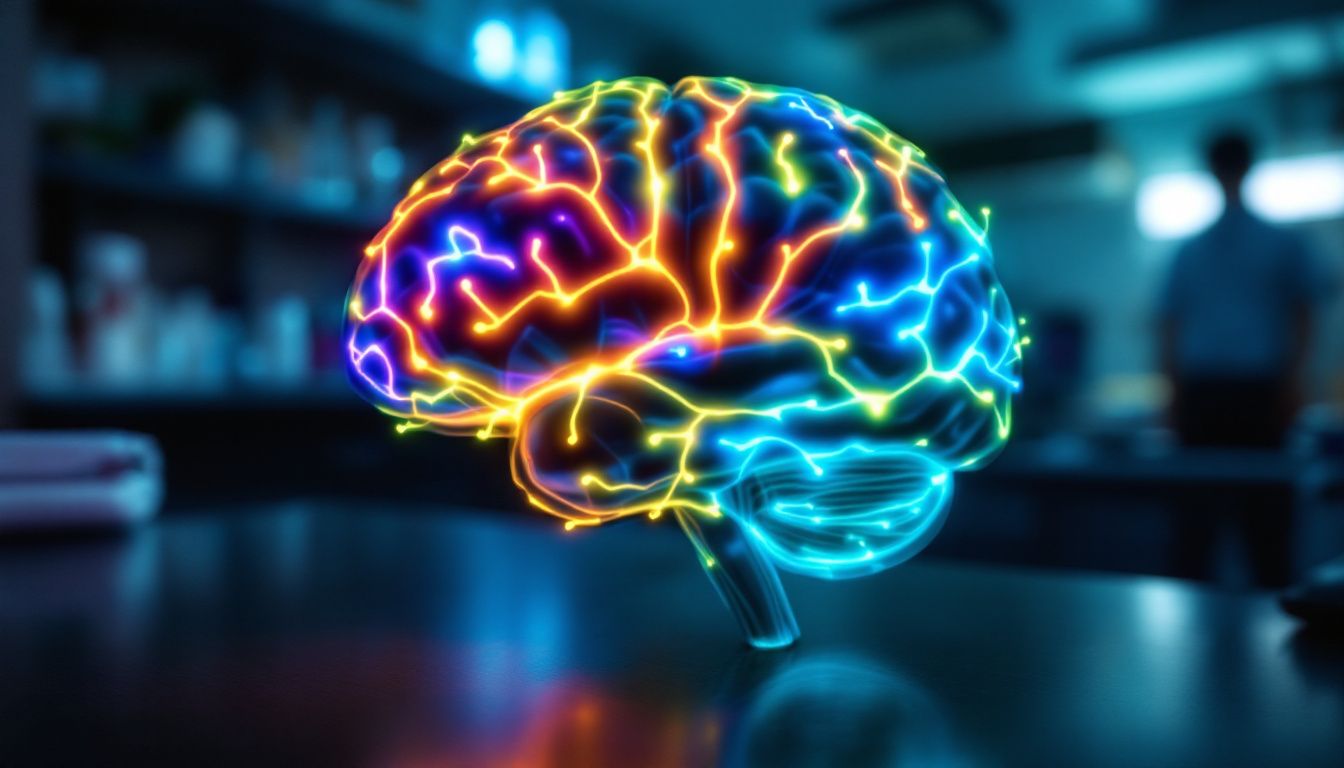Do you think your brain stops growing as you age? Science shows that adults can grow new brain cells through neurogenesis. This process happens in parts of the brain connected to memory and learning, like the hippocampus.
Thank you for reading this post, don't forget to subscribe!Keep reading to learn how it works—and why it matters for your health!
Key Takeaways
- Adults can grow new brain cells through neurogenesis, especially in the hippocampus. This area supports memory, learning, and emotions.
- The adult hippocampus creates 700–1,500 neurons daily. Activities like exercise and mental challenges boost this process.
- Studies show a link between regular aerobic exercise and up to 2% growth in older adults’ hippocampal size (University of Pennsylvania).
- Chronic stress harms neurogenesis by raising glucocorticoids. Relaxation techniques like mindfulness or yoga help protect brain health.
- Neurogenesis may combat Alzheimer’s disease, Parkinson’s disease, dementia, and age-related cognitive decline.
What Is Neurogenesis?

Neurogenesis means the creation of new neurons, or brain cells, in the human brain. It plays a huge role in prenatal development and continues in certain parts of the adult central nervous system.
The hippocampus—key for learning, memory, and emotions—is one area where neurogenesis happens even as people age. Though its rate slows over time, studies show that it never completely stops.
Neuroscientists have found that neural stem cells produce these new nerve cells throughout life. This process is crucial for keeping the brain flexible and healthy. Researchers discovered strong evidence of this ongoing neuron generation in areas like the dentate gyrus within the hippocampus.
Neurogenesis offers hope for treating conditions like Alzheimer’s disease, Parkinson’s disease, or cognitive decline tied to aging or injuries like traumatic brain injury.
Research on Neurogenesis in Adults
Scientists once thought the adult brain could not grow new neurons. Recent studies now show that the human brain continues to create cells, even in later years.
Neurogenesis in the Hippocampus
The hippocampus plays a key role in neurogenesis. This process happens mainly in the dentate gyrus, a part of the hippocampus linked to memory and emotions. Adult neurogenesis begins with radial glia-like precursor cells.
These cells change into intermediate progenitor cells before maturing into fully functioning neurons.
Each day, the hippocampus can create about 700 to 1,500 new brain cells. These neurons take roughly seven weeks to mature but show high synaptic plasticity during that time. This ability allows them to form strong neural connections critical for learning and long-term memory.
Neurogenesis here supports emotional regulation and protects against age-related cognitive decline or conditions like Alzheimer’s disease and depression.
Evidence of Lifelong Neuron Formation
Studies confirm that new brain cells can form throughout life. In 2019, researchers examined brain tissue from 58 deceased individuals, including Alzheimer’s patients. They found evidence of neuron growth in the hippocampus—a key area for memory and learning.
Proper preservation of brain tissue proved crucial for detecting neural stem cells and new neurons.
The study suggested fewer neurons in the hippocampi of Alzheimer’s patients compared to healthy brains. This decline may signal early stages of the disease. These findings challenge a 2018 Nature study that questioned lifelong neurogenesis, providing hope for better understanding cognitive health and combating degenerative diseases like Parkinson’s or Huntington’s disease.
Factors That Support Neurogenesis
Your brain can form new neurons throughout life, and certain activities can help this process. Small changes in your daily habits may boost the generation of brain cells and support overall cognitive health.
Physical Exercise
Aerobic exercise can grow new brain cells, especially in the hippocampus. Studies show it increases hippocampal size and improves brain function. The University of Pennsylvania found a 2% growth in older adults’ hippocampal size after regular aerobic activity, reversing some effects of aging.
At the University of Chicago, research revealed that this type of exercise boosts cell production and supports genetic encoding.
Physical activity also raises levels of brain-derived neurotrophic factor (BDNF). This protein helps neural stem cells form into functional neurons. A 2018 review found aerobic workouts significantly impact the left side of the hippocampus.
Activities like running or cycling promote not just fitness but better cognitive health too.
Exercise is a miracle drug for your brain, says Rudolph Tanzi, Harvard Medical School professor.
Mental Stimulation
Challenging your brain can help grow new neurons. Tasks like solving puzzles, learning a new skill, or playing musical instruments work best. Effortful learning boosts the survival of neural stem cells and strengthens neural circuits.
Complex activities also promote neuron integration into existing networks.
Enriched environments support mental stimulation and neurogenesis in adults. For example, Elizabeth Gould’s research shows better growth of new brain cells in engaging settings. Mental effort during critical development windows—when neurons are 1-2 weeks old—increases their survival rate significantly.
Stress Management
Stress raises glucocorticoid levels, which can harm neurogenesis. Chronic stress lowers the production and survival of new brain cells in areas like the hippocampus. It also interrupts cell differentiation, limiting cognitive health benefits tied to neurogenesis.
Relaxing activities help reduce stress’s effects on neural stem cells. Deep breathing, yoga, or hobbies improve brain health over time. Getting enough sleep is another key factor for promoting memory improvement and combating age-related memory loss.
Effective stress control supports lifelong neuron formation—critical for dealing with neurological diseases.
Why Neurogenesis Matters
Neurogenesis helps keep your brain sharp and supports learning, memory, and overall cognitive health—discover its potential benefits next.
Cognitive Function and Memory
The hippocampus plays a key role in memory and learning. Damage to this area can lead to severe memory problems, especially with recalling events or facts. Adult neurogenesis here helps maintain cognitive fitness by forming new brain cells that strengthen connections between neurons.
New neurons improve synaptic plasticity, helping the brain adapt and store information more effectively. Tasks like puzzles or learning new skills boost the survival rates of these neurons, enhancing memory improvement over time.
Engaging activities protect against cognitive decline linked to aging or diseases such as Alzheimer’s disease and dementia.
Potential for Combating Neurological Diseases
Neurogenesis offers hope for treating brain diseases like Alzheimer’s, Parkinson’s, and Huntington’s. Neural stem cells (NSPCs) can create new brain cells and replace damaged ones.
Experimental studies show that NSPCs restore function by integrating into the nervous system. This approach could improve symptoms in conditions such as dementia or traumatic brain injury.
With a projected 35% rise in Alzheimer’s cases from 2015 to 2030, boosting neurogenesis may play an important role.
Strategies focus on enhancing neuron survival and promoting neural precursor cell differentiation. Research suggests physical exercise or therapies targeting stress management may aid this process over time.
New treatments based on genetic therapies are also being studied for slowing degenerative brain diseases like Parkinson’s disease, which affects motor neurons. Scientists continue exploring how adult neurogenesis might combat age-related cognitive decline worldwide by supporting cognitive fitness at all stages of life.
The Role of Stress Management in Neurogenesis
High stress levels harm brain health. Stress increases glucocorticoids, which block the generation of new neurons and disrupt connections in the hippocampus. This makes it harder for your memory to work well and impacts cognitive function.
Chronic stress also triggers inflammation, worsening its effects on neurogenesis.
Relaxation techniques like mindfulness or deep breathing can lower stress hormones. Leisure activities and proper sleep help repair damaged brain cells while promoting neuron growth.
A positive mindset further aids mental recovery, reducing the lasting harm caused by anxiety disorders or PTSD. These actions improve overall cognitive fitness and may slow conditions like Alzheimer’s disease or Parkinson’s disease—setting up a foundation for boosting memory improvement next.
Conclusion
Your brain can grow new cells. Neurogenesis, even in adults, is real and exciting. Exercise, mental activity, and managing stress all help boost this process. These new neurons may improve memory, learning, and fight age-related decline.
Caring for your brain health today can lead to a sharper mind tomorrow.
References
- https://www.verywellmind.com/adult-neurogenesis-can-we-grow-new-brain-cells-2794885
- https://www.health.harvard.edu/mind-and-mood/can-you-grow-new-brain-cells (2016-09-14)
- https://pmc.ncbi.nlm.nih.gov/articles/PMC4563705/
- https://www.scientificamerican.com/article/the-adult-brain-does-grow-new-neurons-after-all-study-says/ (2019-03-25)
- https://pmc.ncbi.nlm.nih.gov/articles/PMC4000963/
- https://pmc.ncbi.nlm.nih.gov/articles/PMC7752270/
- https://pmc.ncbi.nlm.nih.gov/articles/PMC3191246/
- https://pmc.ncbi.nlm.nih.gov/articles/PMC3715962/
- https://pmc.ncbi.nlm.nih.gov/articles/PMC4677120/
- https://pmc.ncbi.nlm.nih.gov/articles/PMC5439504/
- https://www.health.harvard.edu/mind-and-mood/the-book-of-neurogenesis
- https://pmc.ncbi.nlm.nih.gov/articles/PMC4340249/
